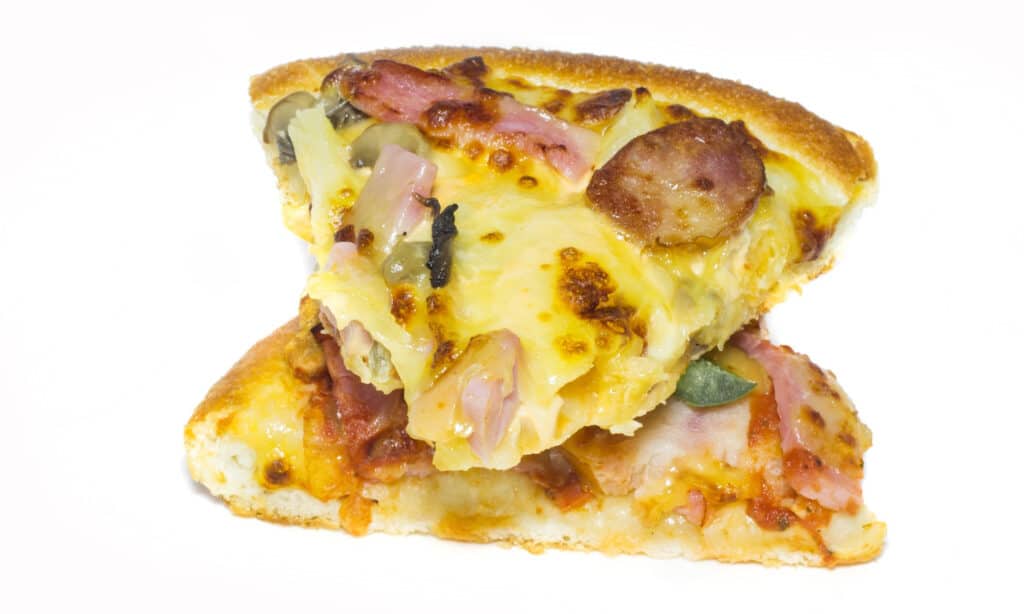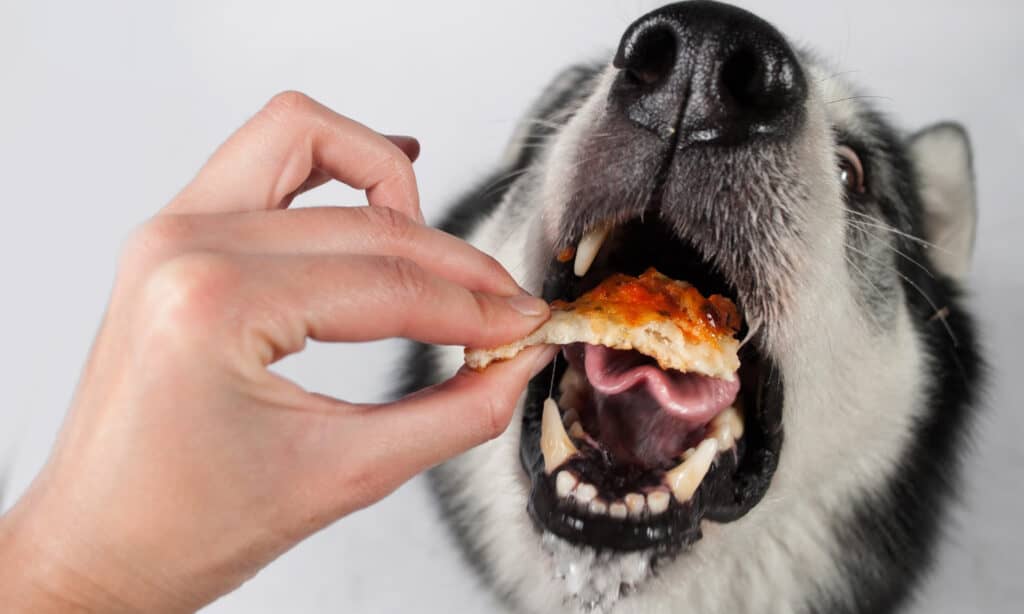If you’re a pizza lover, you may have caught your furry friend giving you puppy dog eyes while you enjoy your favorite slice. While sharing your pizza crust with your dog may seem like a harmless way to show your love, you might be wondering if it’s actually safe for them to eat. In this blog post, we’ll take a closer look at whether dogs can eat pizza crust and explore the potential benefits and risks of sharing this popular snack. We’ll also offer some healthy alternatives that you can feel good about giving to your furry friend. So, let’s dive in and find out if sharing your pizza crust is a good idea for your dog!

Can Dogs Eat Pizza Crust? Exploring the Safety of Sharing This Popular Snack
Pizza crust is a beloved treat among many humans, but is it safe for our furry friends to enjoy too? The short answer is no, your don’t shouldn’t be eating lots of pizza crust. While it might be tempting to share a slice of pizza or a crust with your dog, it’s important to consider the potential risks and benefits before doing so.
One of the main concerns with feeding dogs pizza crust is the ingredients that it contains. Traditional pizza crust is typically made with wheat flour, water, yeast, and salt, which may not be the best choice for all dogs. For example, some dogs may have difficulty digesting wheat flour, which could lead to gastrointestinal upset.
Additionally, certain toppings commonly found on pizza, such as garlic and onions, can be toxic to dogs and should always be avoided. Even if the crust itself is safe, it’s important to ensure that any toppings you add to your pizza are also safe for your furry friend.
Despite these potential risks, there are some potential benefits to feeding dogs pizza crust. For example, some dogs may find it to be a tasty and enjoyable snack, which can be a great way to bond with your furry friend. However, it’s important to keep in mind that moderation is key. Pizza crust should not be a regular part of your dog’s diet.
What is Pizza Crust Made Of?
Pizza crust is the foundation of any great pizza, but what exactly is it made of? In general, pizza crust is typically made with a few simple ingredients, including flour, water, yeast, and salt.
The type of flour used in pizza crust can vary, but it’s usually a type of wheat flour. While wheat flour is generally safe for dogs to eat in small amounts, some dogs may have difficulty digesting it, which could lead to gastrointestinal upset. If you’re considering sharing pizza crust with your furry friend, it’s always a good idea to monitor their reaction and watch for any signs of discomfort or illness.
Water is another key ingredient in pizza crust, as it helps to hydrate the dough and give it the right consistency. Yeast is also an important component, as it helps the dough to rise and become fluffy. Salt is usually added for flavor and to help regulate the dough’s fermentation.
These ingredients are generally safe for dogs to eat in small amounts. However, it’s important to keep in mind that pizza crust is typically high in carbohydrates. It may not be the healthiest choice for your furry friend.

Pizza Crust and Dogs: Understanding the Risks and Benefits
If you’re considering sharing pizza crust with your furry friend, it’s important to understand both the risks and benefits. Let’s take a closer look.
On the one hand, pizza crust can be a tasty and enjoyable treat for some dogs. It’s relatively easy to digest and may provide a small amount of carbohydrates and nutrients. Additionally, sharing pizza crust with your dog can be a great way to bond and show them some love.
However, there are also some potential risks to feeding dogs pizza crust. As we mentioned earlier, some dogs may have difficulty digesting wheat flour, which could lead to gastrointestinal upset. Additionally, pizza crust is typically high in carbohydrates and may contribute to weight gain or other health issues if fed in excess. Finally, certain toppings commonly found on pizza, such as garlic and onions, can be toxic to dogs and should always be avoided.
Offer small amounts of pizza crust and monitor your dog’s reaction to minimize the risks of feeding it to them. If your dog experiences any gastrointestinal issues or other adverse effects after eating pizza crust, it’s best to avoid feeding it to them in the future.
Why Pizza Crust May Not Be the Best Choice for Your Furry Friend
While pizza crust may seem like a harmless treat for your furry friend, there are a few reasons why it may not be the best choice for their health.
Pizza crust is high in carbohydrates, which can contribute to weight gain or other health issues if fed in excess. Dogs have different nutritional needs than humans, and their diets should be tailored to their specific needs. Feeding them too many high-carbohydrate foods like pizza crust can throw off their nutritional balance and contribute to health problems.
Second, some dogs may have difficulty digesting wheat flour, which is a common ingredient in pizza crust. This can lead to gastrointestinal upset, including vomiting and diarrhea. If your dog has a history of digestive issues or food sensitivities, it’s especially important to be cautious when offering them pizza crust.

Alternatives to Pizza Crust for Dogs
If you’re looking for a healthier alternative to pizza crust for your furry friend, there are plenty of options to choose from. Here are a few ideas to get you started:
- Sweet potato slices: Sweet potatoes are a great source of fiber, vitamins, and antioxidants, and many dogs love the taste. Simply slice a sweet potato into thin rounds. Then bake them in the oven until they’re crispy, and offer them as a tasty snack.
- Carrot sticks: Carrots are another nutritious and tasty option for dogs. They’re high in fiber and beta-carotene, which can support eye health and immune function. Simply chop up some carrot sticks and offer them as a crunchy treat.
- Apple slices: Apples are a good source of fiber and vitamin C, and many dogs love the taste. Just be sure to remove the seeds and core before offering them to your furry friend.
- Homemade dog treats: If you’re feeling creative, you can try making your own dog treats at home. There are plenty of easy recipes available online that use simple, healthy ingredients like peanut butter, pumpkin, and oats.
By offering your furry friend these healthier alternatives to pizza crust, you can provide them with a tasty and nutritious snack that won’t compromise their health. Just be sure to introduce new foods gradually. Monitor your dog’s reaction to ensure they don’t experience any adverse effects.
Conclusion
In conclusion, while pizza crust may be a popular snack for humans, it’s important to consider the potential risks and benefits before sharing it with your furry friend. Pizza crust is a treat for dogs, not a nutritionally balanced food, so offer it in moderation.
If you do decide to offer your dog pizza crust, be sure to avoid any toppings that may be harmful to their health, such as garlic or onions. Additionally, keep in mind that some dogs may have difficulty digesting wheat flour, which is a common ingredient in pizza crust.
Overall, if you’re looking for a healthy and nutritious snack for your furry friend, there are plenty of alternatives to pizza crust to choose from. Sweet potato slices, carrot sticks, apple slices, and homemade dog treats are all great options. They can provide your dog with the nutrients they need without compromising their health.
Remember, when it comes to feeding your dog, it’s important to prioritize their health and well-being above all else. By offering them a balanced and nutritious diet, you can help ensure they live a long and happy life by your side.
~Sheena
